Descriptive analysis of mental health difficulties across gender and sexual minorities
Past research has identified differences among lesbian, gay, bisexual, transgender, queer and intersex (LGBTQI+) individuals and heterosexual individuals in mental distress and wellbeing. However, not may studies include sexual orientations such as pansexual and asexual. The current study explores the prevalence of mental health difficulties among a wide range of different gender identities and sexual orientations. Findings point towards higher mental health difficulties among sexually marginalised adolescents.
EBPU key findings

The annual EBPU key Findings booklet highlights key messages from our research over the last year. Findings are divided across our four priority themes: risk, resilience, change and choice.
The Mercers' Company schools evaluation
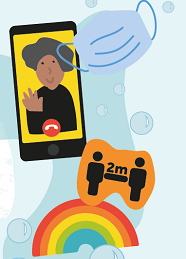
- Mercers’ Wellbeing Evaluation Programme: final report
- Mercers’ Wellbeing Evaluation Programme: final report (executive summary)
- What do we know about mental health?
- Evaluating programmes to support pupil mental health and wellbeing: examples from schools and colleges working with the Mercers' Company
- Engaging students with wellbeing survey findings
- Unprecedented challenges and innovative responses: schools’ and colleges’ experiences of supporting mental health and wellbeing during the coronavirus pandemic
- Children’s mental health in the time of coronavirus: what we know about what hurts and what helps
- Measuring pupil mental health and wellbeing: examples of best practice from schools and colleges working with the Mercers’ Company
 Mental health questionnaire research with children and young people in schools: recommendations for good practice
Mental health questionnaire research with children and young people in schools: recommendations for good practice

Increasingly, children and young people in schools are being asked to complete questionnaires about their mental health and wellbeing for research purposes. This guidance offers a range of recommendations for facilitating self-report mental health data collection with children and young people in schools and colleges. It is relevant to anyone using self-report mental health questionnaires in research in education settings, including academic researchers, schools and colleges, and local authorities.
This guidance was produced by researchers from the Evidence Based Practice Unit, the University of Manchester, Liverpool John Moores University, and the Child Outcomes Research Consortium.
Emerging evidence: coronavirus and children and young people's mental health


A series of rapid reviews of research on children and young people's mental that has been carried out around the world during the coronavirus pandemic.
In the Emerging evidence series, we search for evidence published during the coronavirus pandemic from around the world, to help us begin to answer three questions:
- What are the key mental health challenges for children and young people during the pandemic?
- What are the key mental health challenges for disproportionately affected groups?
- What might help children and young people to manage these challenges?
The series is a collaboration between the Evidence Based Practice Unit and the Child Outcomes Research Consortium.
- Emerging evidence issue 8: 23rd June 2021
- Emerging evidence issue 7: 21st April 2021
- Emerging evidence issue 6: 16th February 2021
- Emerging Evidence issue 5: 11th December 2020
- Emerging evidence issue 4: 21st October 2020
- Emerging evidence issue 3: 26th August 2020
- Emerging evidence issue 2: 17th June 2020
- Emerging evidence issue 1: 22nd May 2020
Mental health and the coronavirus research bite series


We are aware that parents, carers and those working with young people might have questions about how to support children and young people’s mental health and wellbeing during the coronavirus pandemic. We know that it can be hard to find evidence about the best ways to tackle some of these challenges. The Evidence Based Practice Unit is producing a series of ‘research bites’ based on very rapid reviews of existing research. These are not thorough or extensive reviews, rather they aim to offer concise and timely insights on some topical issues.
- Research bite 6: a brief review of protective factors for positive mental health among children and young people of colour
- Research bite 5: supporting pupil mental health and wellbeing during the return to school
- Research bite 4: sleep hygiene during the pandemic
- Research bite 3: talking to children and young people about the pandemic
- Research bite 2: supporting children and young people with unplanned endings
- Research bite 1: self-management strategies for young people experiencing anxiety
Dyslexia and allied reading difficulties and their relationship with mental health problems: a rapid review of evidence


This rapid review looked at published reviews exploring the relationship between dyslexia and allied reading difficulties and mental health. It found that there is increased prevalence of mental health problems in children and young people with dyslexia and allied reading difficulties. Three key pathways explaining this elevated prevalence are explored, and recommendations for research and practice are outlined.
This review was conducted by EBPU on behalf of the Children and Families Policy Research Unit (CPRU).
Social prescribing in children and young people: a review of the evidence

 Wellbeing Measurement for Schools
Wellbeing Measurement for Schools

An online survey for schools wanting to assess the impact of their support, understand particular strengths and challenges and plan prevention and help.
More information:
Digital childhood: addressing childhood development milestones in the digital environment
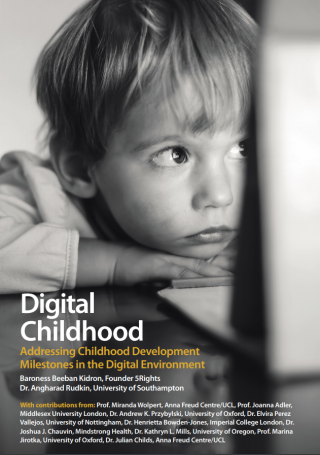

This report considers how growing up in the digital environment directly impacts on a child's development trajectory.
By Baroness Beeban Kidron (Founder, 5Rights) and Dr. Angharad Rudkin (University of Southampton), with contributions from Prof. Miranda Wolpert and Dr. Julian Edbrooke-Childs at EBPU.
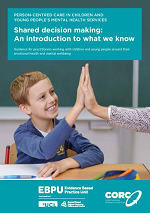 Person-centred care in children and young people's mental health services
Person-centred care in children and young people's mental health services

EBPU and CORC have collaborated with The Health Foundation and Common Room to create a set of guidance for children and young people, commissioners, and practitioners working with children and young people.
For children and young people
For commissioners:
For practitioners:
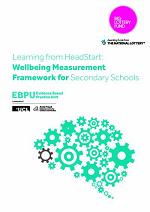 Wellbeing Measurement Framework for schools
Wellbeing Measurement Framework for schools

In collaboration with colleagues from CORC, the University of Manchester and Common Room, we have developed the Wellbeing Measurement Framework (WMF), a suite of measurement booklets for primary school, secondary school and college students.
Each WMF booklet contains a set of validated questionnaires (tailored to each age group) that assess constructs such as positive wellbeing, behavioural or emotional difficulties, the presence and strength of protective factors such as perceived support at school, home and in the community, and ability to deal with stress and manage emotions.
THRIVE Framework
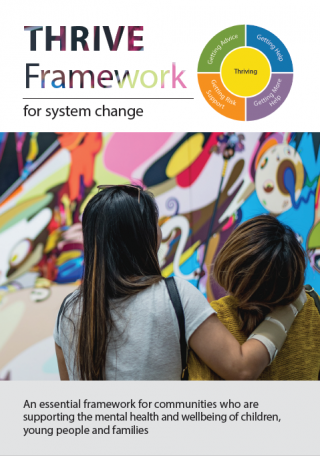
The THRIVE Framework provides a set of principles for creating coherent and resource-efficient communities of mental health support for children, young people and families.
It aims to talk about mental health and mental health support in a common language that everyone understands.
The Framework is needs-led. This means that mental health needs are defined by children, young people and families alongside professionals through shared decision making. Needs are not based on severity, diagnosis, or health care pathways.
There are two published versions of the Framework available:
- THRIVE Framework for system change (2019). An accessible summary of the Framework including case studies and examples of the THRIVE Framework and Principles in practice.
- THRIVE Elaborated: Second Edition (2016). The full framework including a foreword about the THRIVE Framework as a multi-agency initiative.
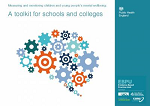 Measuring and monitoring children and young people's mental wellbeing: a toolkit for schools and colleges
Measuring and monitoring children and young people's mental wellbeing: a toolkit for schools and colleges

The aim of this toolkit is to make schools and college staff aware of the range of validated instruments that can be used to measure and monitor student mental wellbeing.
The toolkit will be of interest to senior leadership teams and those with particular responsibilities for special educational needs and disabilities (SEND), inclusion, personal, social, health and economic education (PSHE), welfare or pastoral support and mental health support. It will also be of interest to partners from the health, voluntary and community service sector who are supporting schools and colleges to improve mental health outcomes for children, young people and their families.
EBPU Logic Model
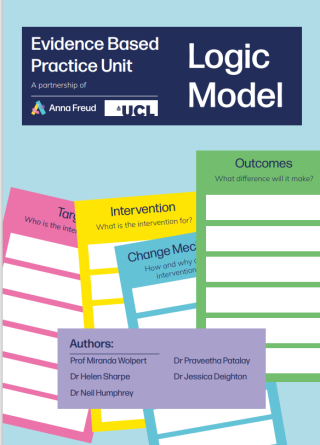
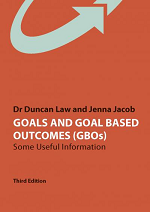 Goals and Goal Based Outcomes (GBOs): some useful information (3rd ed.)
Goals and Goal Based Outcomes (GBOs): some useful information (3rd ed.)

The third edition of advice on how to use goals and goals based outcomes includes a section on setting goals when working with children and young people with learning disabilities, suggestions of how to word GBO discussions and using GBOs on a session-by-session basis.
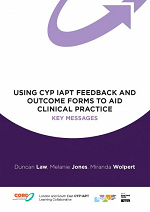 Using CYP IAPT feedback and outcome forms to aid clinical practice: key messages
Using CYP IAPT feedback and outcome forms to aid clinical practice: key messages

A short guide to using feedback and outcome forms in clinical practice.
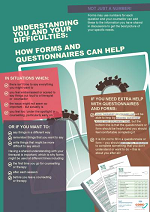 Understanding and helping you and your problems - how forms and questionnaires can help
Understanding and helping you and your problems - how forms and questionnaires can help

A short leaflet for young people explaining how forms and questionnaires can be used to help them and also some of their rights.
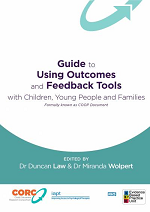 Guide to using outcomes and feedback tools with children, young people and families
Guide to using outcomes and feedback tools with children, young people and families

Edited by Duncan Law and Miranda Wolpert, this guide provides a toolkit setting out the forms recommended by CYP IAPT and CORC, in a coherent and structured way. It outlines their uses as clinical tools and as evaluation tools, including helpful tips and advice on using the forms in everyday clinical practice.
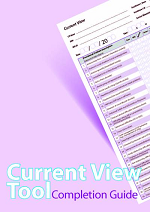 Current View Tool completion guide
Current View Tool completion guide

A booklet developed by members of EBPU and others as part of the Payment by Results in CAMHS Pilot Project.
This booklet gives an overview of the Current View Tool before providing guidance on completing the tool.
 Close
Close

